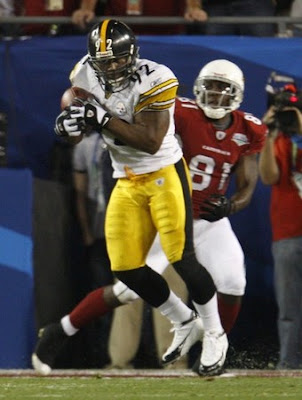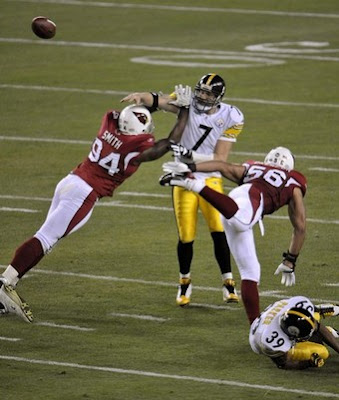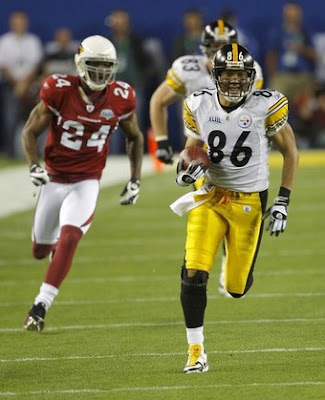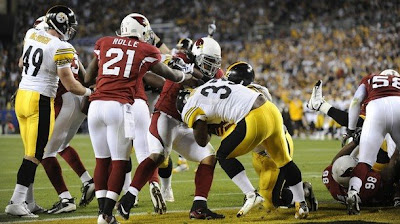http://www.fanhouse.com/
Posted Feb 2nd 2009 1:47 AM
 James Harrison intercepts a pass in front of Arizona Cardinals wide receiver Anquan Boldi and runs 100 yards for a second quarter touchdown during the NFL's Super Bowl XLIII football game in Tampa, Florida, February 1, 2009. (Reuters)
James Harrison intercepts a pass in front of Arizona Cardinals wide receiver Anquan Boldi and runs 100 yards for a second quarter touchdown during the NFL's Super Bowl XLIII football game in Tampa, Florida, February 1, 2009. (Reuters)TAMPA, Fla. -- We don't watch Super Bowls for the chip dip, as Bruce Springsteen wisecracked during his 12-minute party. We crave the emotional bull rush, a crescendo finish, the natural high that Michael Phelps finds in a marijuana pipe. The big game used to bore like a 4 a.m. infomercial, but Sunday, it delivered again, like last year, hijacking our senses with head-banging, back-and-forth drama that even might have thrilled The Boss, the rocker who hates football.
Was it the greatest Super Bowl ever? I'll call it the most stirring climax of the 43, better than Eli Manning and David Tyree's helmet, a rousing escape from the bleak national condition. If this masterpiece theater between the Steelers and Cardinals had ended with what seemed the perfect storyline -- Kurt Warner scratching back, in a metaphor for his life, and finding Larry Fitzgerald slashing down the Pittsburgh gut on a 64-yard scoring dash as Larry Sr. refrained from cheering in the press box -- who knew that the ultimate thrust of Super Bowl oneupsmanship was forthcoming in the final two minutes?
"I actually was thinking if they were going to score, that's how you want them to score -- extremely quick, so we'd have time to execute a two-minute drive," said Mike Tomlin, the 36-year-old coach with the cool-cat facial hair and fiftysomething wisdom. "I was probably over it by the time (Fitzgerald) got in the end zone because we've been in those situations so many times. We're never pretty. But we never blink, either.
"We embrace those moments. We're built for those moments."
And, in the end, they are defined by those moments.
 Arizona Cardinals wide receiver Larry Fitzgerald runs past Pittsburgh Steelers defenders Ike Taylor (L) and James Harrison after catching a pass for a touchdown during the fourth quarter of the NFL's Super Bowl XLIII football game in Tampa, Florida, February 1, 2009. (Reuters)
Arizona Cardinals wide receiver Larry Fitzgerald runs past Pittsburgh Steelers defenders Ike Taylor (L) and James Harrison after catching a pass for a touchdown during the fourth quarter of the NFL's Super Bowl XLIII football game in Tampa, Florida, February 1, 2009. (Reuters)This is no rip on the Cardinals, who belied their dubious history and goofy bird-beak logo by shaking off killer penalties and coming back strong against the acclaimed Blitzburgh defense. But there's a reason the Steelers are the Steelers, the best-run organization in American sports. When presented with their assignment -- 2:37 left, down 23-20, 78 yards to victory -- did anyone dare doubt them? I predicted on this site on Sunday that they would win their sixth Super Bowl title, which came a year after writing that the New England Patriots had no chance of (gulp) losing. That said, I was not jittery in the least. The huge patches of Steelers fandom inside Heinz Field South, a group that outnumbered Arizona fans by 10 to 1, showed no signs of anxiety or upchucking, either. The only issue was how Ben Roethlisberger, who blamed nerves for his poor outing in the Steelers' championship victory over Seattle three years ago, would respond with his big-game reputation hanging in the pleasant Florida air.
Big Ben? Or Big Bust? Hadn't he said his "legs were rubbery" in his last Super Bowl, that he was too distracted by tension to develop a rhythm? And that was with a lead. What now, with the Steelers trailing and depending on him to earn his $102 million contract and thwart the budding Arizona miracle?
"I wasn't nervous at all. I didn't have any jitters," reported Roethlisberger, who was head-butting teammates throughout the night. "I was only nervous when the planes flew over before the game. I felt great."
If he's never going to be confused with history's elite quarterbacks, no one can question Roethlisberger's bullishness and grit. Now, we'll stop doubting his poise and wherewithal as well. He stepped into the huddle, knowing that tens of millions were watching and waiting to judge him by by this moment, and uttered the words that Pittsburgh won't soon forget. "It's now or never guys," he told his offensive teammates. "You'll be remembered forever if you do this. All the film study, all the hard work, all the stuff that people talked bad about us -- it will be for nothing. We have to go out and do this."
 Ben Roethlisberger completes a pass to Heath Miller while being pressured by Arizona Cardinals defenders Antonio Smith (L) and Chike Okeafor in the first quarter of the NFL's Super Bowl XLIII football game in Tampa, Florida February 1, 2009. The Steelers' Willie Parker (R) is pictured on the ground. (Reuters)
Ben Roethlisberger completes a pass to Heath Miller while being pressured by Arizona Cardinals defenders Antonio Smith (L) and Chike Okeafor in the first quarter of the NFL's Super Bowl XLIII football game in Tampa, Florida February 1, 2009. The Steelers' Willie Parker (R) is pictured on the ground. (Reuters)The job took two minutes and two seconds. With Roethlisberger scrambling, pump-faking and flipping darts, moving quite adroitly for a 250-pounder, he masterfully led the drive and wisely used the big-play skills of Santonio Holmes. You might remember what I wrote about Holmes on Friday, that he projected as the first former drug dealer to morph into a Super Bowl hero. If he was trying to help children by admitting to his past mistakes, he certainly developed a new cult following with his breakout performance, outdueling Fitzgerald with a nine-catch, 131-yard piece of artwork. He saved his best stuff for the final drive. With Ben clearly enjoying himself and playing pitch-and-catch out of the shotgun formation, he found Holmes for a critical 40-yard play to the Arizona 6.
There was plenty of time, 48 ticks, for a shot or two at the end zone and the victory. So Roethlisberger and offensive coordinator Bruce Arians again sought Holmes, this time with high jeopardy shadowing high reward. Ben risked so much -- his legacy, his team's first ring for the other hand -- when he drilled a pass in traffic as Holmes raced to the back of the end zone. He had to throw it past cornerback Ralph Brown. He had to deposit it in a place where safety Aaron Francisco couldn't intercept it. But he did just that, and not only did Holmes rise up to snag the football, he delicately placed his feet together and touched his toes against the paint like an expert ballerina. Cardinals coach Ken Whisenhunt, who once coached all of these players as the Steelers' offensive coordinator, eagerly awaited the challenge. He lost it -- and the game.
"I just feel empty, like it was all for nothing,'' said Fitzgerald, who rallied his team with his explosiveness, only to be upstaged. "It's going to be hard to pick up the pieces. It hurts."
This was Joe Montana to Dwight Clark. This was Son of the Immaculate Reception. In fact, this was bigger because it won the world championship, not merely a conference title or playoff game. And what was the play called, for posterity? "Drop back, scramble right, scramble left, find someone open," joked Roethlisberger, who joins Tom Brady as the youngest quarterbacks to win two Super Bowls. "I saw 'Tone' in the corner and decided to throw it high, because either he was going to catch it or no one was going to catch. Luckily, he made a heck of a play."
 Hines Ward runs away from Arizona Cardinal safety Adrian Wilson after a catch during the first quarter of the NFL's Super Bowl XLIII football game in Tampa, Florida, February 1, 2009. (Reuters)
Hines Ward runs away from Arizona Cardinal safety Adrian Wilson after a catch during the first quarter of the NFL's Super Bowl XLIII football game in Tampa, Florida, February 1, 2009. (Reuters)Lucky, it wasn't. Holmes has enormous talent and, with Tomlin's guidance, should be on his way to a productive career. What was hypocritical about his Just Say No, anti-drug-dealing speech the other day is that he got caught in a marijuana bust by Pittsburgh police in October. Maybe this is the beginning of a mature, new life for the pride of Belle Glade, Fla., the crime-and-poverty town where he hustled on a street corner for a year as a teenager.
"My feet never left the ground," Holmes said of his toe-tapping exhibition. "All I did was extend my arms and use my toes as an extra extension to catch up to the ball. Before the drive, I told Ben, 'I want the ball in my hands no matter what, no matter where it is.' I wanted to be the one to make the big play at the end, and I did it for my team."
Holmes knows what the six-pack of championships means for the Steelers. "We're going down in history with one of the greatest games ever played in the Super Bowl, and we have more championships than any other team," he said. Correct, sir. The Steelers own six of the first 43 trophies, and much as Tomlin tried to deflect praise to the Rooney family, it's hard not to be amazed by the discipline and energy he has instilled in only two years after replacing Bill Cowher, a damned good coach himself. Tomlin is the blueprint for what NFL owners want: a young, fiery leader young enough to relate to players but smart enough to command their attention and respect.
The new guy had to learn some lessons himself. At first, he was a madman of sorts, telling his players, "I'm going to make you miserable." He developed a peer-pressure device called "The News" -- as in, if you don't want to be on The News, don't get in trouble or screw up on Sundays. "Some of us went to him and said, 'Hey, coach, we've got a lot of veterans, and you don't have to make us miserable,' " safety Ryan Clark said. "I think he learned from that." In the final practices in Tampa, Tomlin joked with his team each day, and the laughter that emanated from the training facility reflected how the players and head coach have grown as one.
"I'm not concerned about my personal milestones," said Tomlin, keeping a firm upper lip afterward. "I just want to contribute to the legacy that is the Pittsburgh Steelers. I'm very blessed to be hired by the Rooney family. They took a chance on a 34-year-old coach with not a long resume, and I understand that. They took a little criticism for that, and I took it personally. I wanted to ante up and add to their legacy, and thankfully, with the help of a great coaching staff and great players, we were able to do that tonight."
 Gary Russell (#33) of the Pittsburgh Steelers scores a touchdown past the Arizona Cardinals during Super Bowl XLIII at Raymond James Stadium in Tampa, Florida on February 1, 2009. (Getty Images)
Gary Russell (#33) of the Pittsburgh Steelers scores a touchdown past the Arizona Cardinals during Super Bowl XLIII at Raymond James Stadium in Tampa, Florida on February 1, 2009. (Getty Images)Roethlisberger and the offense won the game, but earlier, defense typically pushed the Steelers to a 17-7 lead. The best Super Bowl finish was preceded by the best play to end a Super Bowl first half: James Harrison's 100-yard interception return for a touchdown. He stepped in front of a Warner slant pass and rumbled down the sideline like, well, the truck he was going to drive in Akron, Ohio, after one of the three times he was cut by the Steelers earlier this decade. He was helped by precise blocks by defensive teammates and tumbled into the end zone as Fitzgerald and Steve Breaston tried to pry the ball loose. He lay in the paint for a long time while officials reviewed the play. If Harrison had been ruled down at the Arizona 1, the Steelers wouldn't have gotten any points because time had expired. But the replay people ruled properly.
This is the same James Harrison who won the NFL's Defensive Player of the Year award, the classic Dick LeBeau project who has become the prototype linebacker who can rush the passer and drop back in coverage. He was moping all week about not dropping back enough, so you can say he took advantage of an opportunity. Not only was it the longest scoring play in Super Bowl history, it was the most electrifying and game-changing.
"Those last couple of yards were harder than anything I've done in my life," said Harrison, one of 14 children. "All I was thinking about when I was running was helping my team win and scoring six."
And why did he lay there for so long? "I kinked up my neck a little bit," he said, "and air was a problem, too."
It was for all of us. Dull as the week was, the game was spectacular. "Some said we couldn't top last year's Super Bowl, but the Steelers and Cardinals did that tonight," said Roger Goodell, the NFL commissioner. In the middle of the celebration was Dan Rooney, the man who created the Steeler mystique, the pioneer who fought to create the Rooney Rule that has helped minorities such as Tomlin win head-oaching opportunities. It's only February, but Rooney is my Sportsman of the Year. And he was quick with a reply when asked how many more trophies he can fit in one case.
"We'll make room," he said.
Jay Mariotti is a national columnist and commentator for FanHouse.com. He is a daily panelist on ESPN's sports-debate show, "Around The Horn," seen Monday through Friday at 5 p.m. ET. Mariotti spent 17 years as a lead sports columnist for the Chicago Sun-Times and has covered every major sporting event -- national and worldwide -- on multiple occasions.


No comments:
Post a Comment